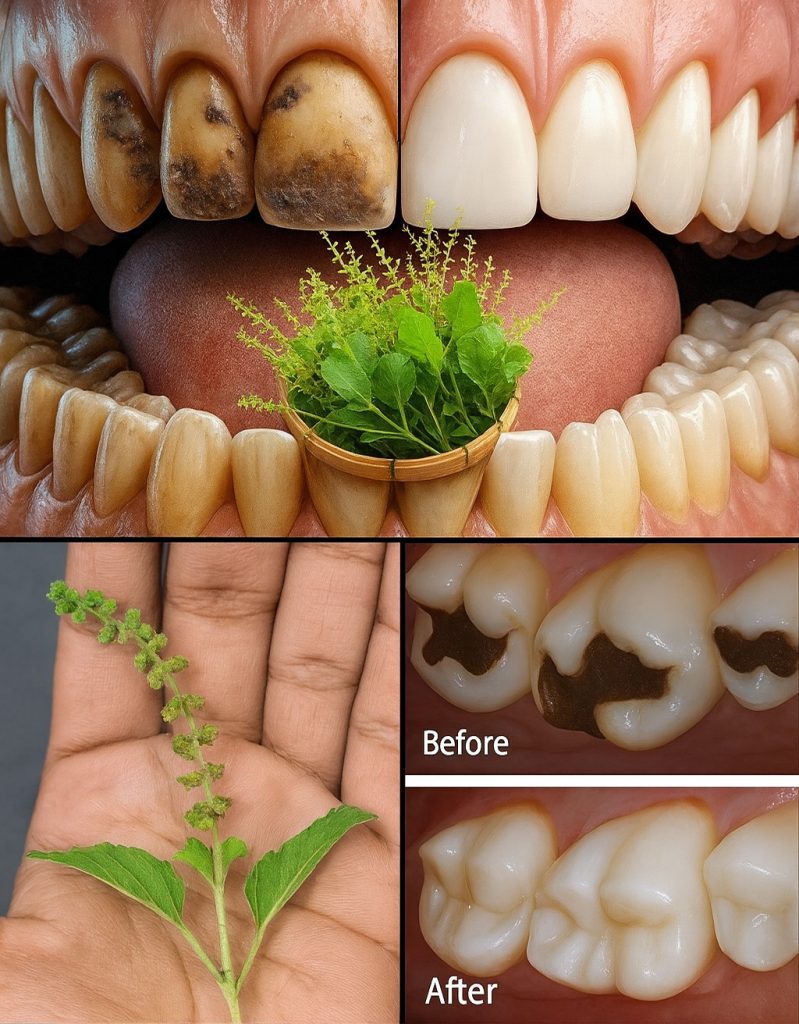Holy Basil, or Tulsi (Ocimum sanctum), is an herb revered in Ayurveda as the “Queen of Herbs.”1 Its power for oral health stems from a unique blend of antibacterial, anti-inflammatory, and astringent properties, making it a viable natural alternative for preventing common dental problems.

Modern research, including some clinical trials, has begun to validate Tulsi’s traditional use for dental hygiene, with some studies showing its effectiveness to be comparable to conventional chemical mouthwash ingredients.
How Tulsi Benefits Your Teeth and Gums

The effectiveness of Tulsi in the mouth is attributed primarily to its rich content of bioactive compounds, particularly eugenol (also found in clove oil) and phenolic acids like rosmarinic acid.2
| Dental Issue | Tulsi’s Solution | Key Benefit |
| Plaque & Cavities | Anti-Cariogenic Action | The antibacterial agents (carvacrol and eugenol) actively fight harmful mouth bacteria, like Streptococcus mutans, that cause plaque buildup and eventual tooth decay. |
| Gingivitis & Periodontitis | Anti-inflammatory & Astringent | Tulsi helps reduce the redness, swelling, and bleeding associated with gum disease. Its astringent nature helps tighten gum tissue. |
| Bad Breath (Halitosis) | Antimicrobial | By killing the underlying bacteria that release volatile sulfur compounds (VSCs)—the main cause of bad breath—Tulsi provides a purifying, fresh scent that is more than just a cover-up. |
| Oral Sores & Ulcers | Analgesic & Healing | Chewing the leaves or using a Tulsi rinse can soothe pain (analgesic) and promote the healing of mouth ulcers and canker sores. |
| Overall Health | Antioxidant Protection | Tulsi’s strong antioxidant profile may protect the lining of the mouth and gums from damage and inflammation. |
How to Use Holy Basil for Oral Care

Tulsi can be easily integrated into your daily oral hygiene routine in several effective forms:3
1. Tulsi Tea Mouthwash (Gargle)4
This is the most common way to utilize its antibacterial and astringent properties.
- Preparation: Steep 1 teaspoon of dried Tulsi leaves (or 5–7 fresh leaves) in 1 cup of hot water for 10 minutes to create a strong tea.
- Use: Allow the infusion to cool completely. Gargle and swish the liquid in your mouth for 30–60 seconds, twice daily, after brushing your teeth.
2. Chewing Fresh Leaves
This is the most traditional Ayurvedic method.
- Preparation: Wash 2–3 fresh Holy Basil leaves.
- Use: Gently chew the leaves and swish the remnants around your mouth before spitting out the pulp. The natural oils are released directly onto the teeth and gums.
3. Natural Tooth Powder
Dried and powdered leaves can be used as an ingredient in a natural toothpaste alternative.5
- Preparation: Mix dried Tulsi leaf powder with other beneficial ingredients like rock salt (for mild abrasion) and baking soda.6
- Use: Wet your toothbrush, dip it into the powder, and brush gently once a day.7
Important Note: While Tulsi mouthwashes have been shown to be as effective as some conventional rinses in short-term studies, they are not a cure for advanced dental disease. Never neglect your routine dental checkups and professional cleanings. If you have a severe toothache, deep cavity, or persistent gum bleeding, consult a dentist immediately.









